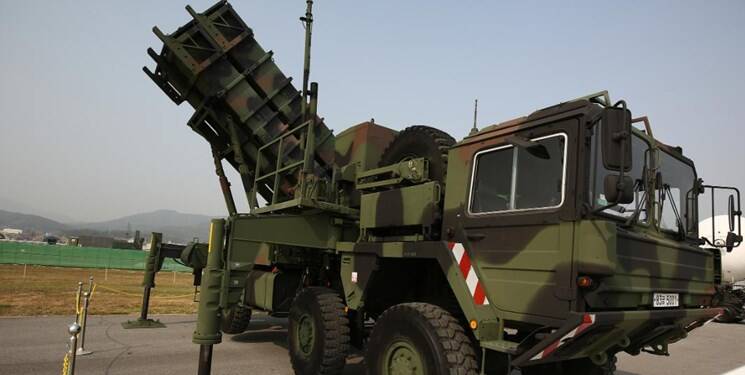Mehrdad Halalkhar told the Strategic Council on Foreign Relations that the decision by the White House to send Patriot missile shields to Ukraine should be examined in three strategic, tactical and technical levels, adding that this US measure is a tactical movement in the more strategic and bigger game between the US and Russia and the NATO and Russia.
“At the macro and strategic level, the achievement of the US in the war in Ukraine is to reduce Russia’s operational capacity by creating erosion in the military and economic power of this country and undermines its international position in terms of Moscow’s violation of international law by invading Ukraine.”
Explaining the achievements of the war for the US with the expense of the European and Ukrainian people and governments, he said “considering that at the level of international media and think tanks, this issue has been seriously considered and analyzed that Russia has received military weapons such as drones and missiles from Iran in order to attack Ukraine’s infrastructure and destroy them and also force Kiev to enter negotiations and accept Moscow’s favorable conditions; Giving the Patriot would help Kiev to keep part of its critical infrastructure and not give in to any deal with Russia.”
Halalkhor added that the US strategy of continuing the process of eroding Russia at the expense of other countries continues with this action. In fact, the US goal is for Ukraine to be able to maintain part of its infrastructure and not to accept talks with Russia so that the war continues.
He further explained the tactical achievements of the US in sending Patriot system to Ukraine, saying that at the tactical level, it should be kept in mind that although the Patriot missiles were one of the most successful missiles of the US Army, they have not been ordering these missiles for several years; Because they are saturated. However, the function of Patriot missiles, more than anything, is to create limited, medium-range and short-range air defense, and this defense is not carried out widely. This system can create a security bubble against air and space attacks against sensitive facilities and infrastructure of Ukraine; For example, it can protect Ukraine’s electricity, water and gas facilities in a bubble.
He said that such weaponry aims at the tactical level to give morale and operational motivation to Ukrainians to continue the war, adding that tactically, giving the Patriot system give such a promise to Zelensky and the Ukrainian ruling elite that the US will continue to support you.
“The Russians emphasized that if the Patriot enters Ukraine, these systems will become targets and cannot create a balance in Ukraine’s favor, but in any case, the Ukrainians must have an incentive to resist, if Russia targets their infrastructure, it is possible that considering the hardships of winter in those regions, they sit to talk with Russia. In this case, the US strategy for the continuation of the war will not be supported.
Halalkhor outlined the technical levels of sending Patriot missile defense shield to Ukraine, saying that at the technical level, there is a point; Patriot systems require operators who need at least thirteen to twenty weeks and in some cases up to fifty-three weeks of maintenance training, but now that the conditions are critical for the US, they have announced that they will send these systems to Ukraine with four weeks of training so that they can benefit from the proper functioning of this system. At the same time, it seems unlikely at the technical level that Russia will be able to strike all these patriots at the technical level. If they are all targetable, Ukraine will not buy them.
Emphasizing that the US is in need of money as each Patriot system requires about 400 million dollars for the main system and about 690 million dollars for the missiles, Halalkhor added that sending such weapons would create a source of income for the US. Ukraine is not a poor country and can exchange the Patriot system with grain and corn.
Referring to the accusations raised against Iran regarding sending missiles and drones to Russia for use in the Ukraine war, this analyst of international issues noted that, in this action, the US is also damaging Iran by creating a psychological atmosphere. The US has actually introduced anti-Iranian discourse into issues related to the war in Ukraine, and smart policies are needed to deal with it.
He said sending Patriot system to Ukraine is the beginning of cooperation between the US and Ukraine at a higher level, adding that it seems that Russia has increased its capabilities, and the West has felt that now is the right time to give this defense system to Ukraine.
Emphasizing that despite some analysis, Patriot systems cannot change the fate of the war alone, Halalkhor said that these systems are mostly tactical and intermediate categories to maintain the balance of the war. As long as Russia is at war, the United States can take extensive international measures against it, if an agreement is reached, it is against the strategic goal of the United States to erode Russia’s power.
Recalling that Russia is now economically under pressure, this international affairs analyst pointed to the extensive international sanctions against this country and added that Russia is the first subject of the US sanctions and the White House does not want this situation to change. Besides, Russia’s main power in the war is based on air attacks, and by reducing this power, Russia will incur damage.










0 Comments